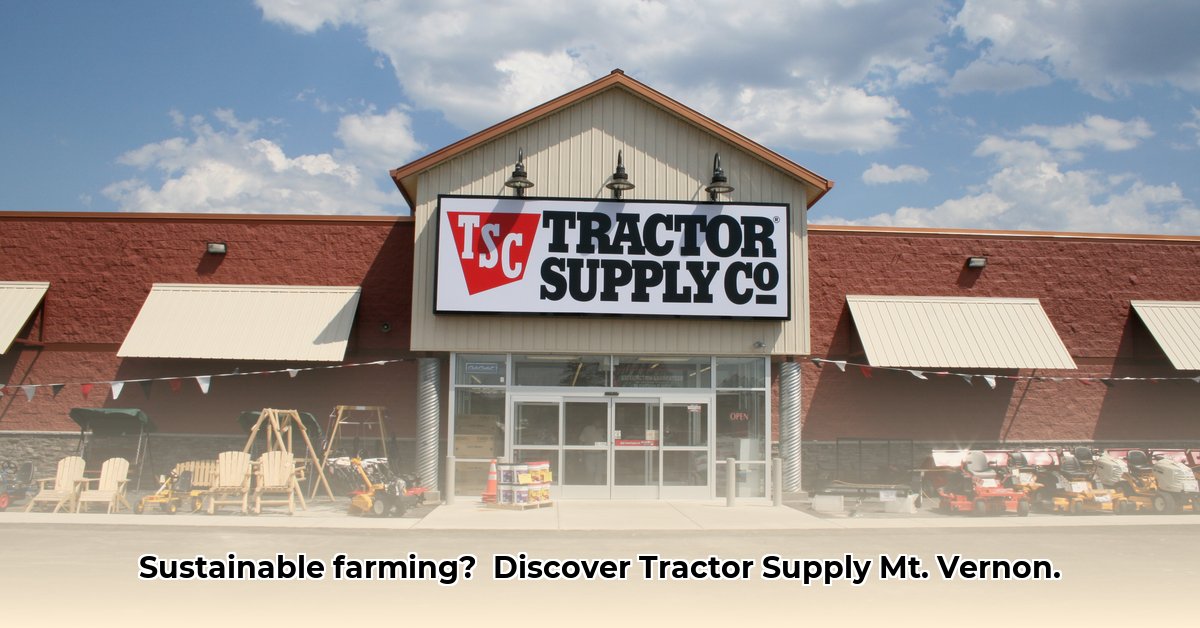
Tractor Supply Mt. Vernon, Ohio: A Local Hub for Sustainable Agriculture?
Tractor Supply Company (TSC) in Mt. Vernon, Ohio, serves as a vital resource for local farmers and gardeners. But how effectively does this local store contribute to sustainable agricultural practices? This article explores TSC's role in promoting sustainable farming in Mt. Vernon, examining its product offerings, addressing challenges, and proposing actionable steps for improvement. We'll delve into the human element, hearing directly from local growers about their experiences, and uncovering whether TSC's contributions are truly impactful. For more examples of TSC's impact, see this similar store's website.
Product Offerings and their Potential for Sustainability
TSC Mt. Vernon offers a range of products potentially beneficial for sustainable agriculture. Water-efficient irrigation systems, tools promoting soil health, and various seeds are available. However, a critical examination reveals a lack of transparency regarding sourcing and certifications for many items. For example, while organic seeds may be available, clear labeling to indicate their origin and certification is often absent. This lack of clarity hinders an accurate assessment of their overall sustainability impact. Are sufficient numbers of locally-sourced, sustainable options readily available to make a meaningful difference in farming practices? This lack of clear labeling makes assessing their contribution difficult.
The Human Element: Local Farmers Share Their Stories
Sarah, a local farmer in Mt. Vernon, relies on TSC for supplies like water-saving irrigation systems and soil health tools, showcasing the potential positive impact of the store. However, Sarah's experience is anecdotal. Further research is needed to determine the extent to which TSC's products are utilized by the wider Mt. Vernon agricultural community in adopting more sustainable methods. What percentage of local farmers are actively employing sustainable practices facilitated by TSC resources? Only comprehensive data can answer this question.
Challenges and Gaps: Transparency and Ethical Sourcing
TSC's commitment to sustainability faces challenges due to a lack of transparency. Information about product origins and the environmental footprint of their supply chains remains scarce. Furthermore, a lack of information regarding animal welfare practices within their supply chain raises concerns about their overall sustainability efforts. The absence of detailed information on sourcing and ethical practices undermines their claims of supporting sustainable agriculture. How can consumers assess the true sustainability of their purchases without such critical information? This lack of transparency is a major obstacle.
A Path Forward: Actionable Steps for Improvement
To enhance its contribution to sustainable agriculture, TSC and its customers can take several crucial steps.
For Tractor Supply:
Conduct a Comprehensive Sustainability Audit: A thorough assessment of their entire supply chain is needed to pinpoint environmental impacts and areas for improvement. This will better inform supply chain decisions and optimize sustainability efforts.
Implement Total Transparency: Clear and consistent labeling of products with detailed information about origins and sustainability certifications (e.g., organic, fair trade) is crucial for consumer awareness and informed decision-making.
Invest in Educational Outreach: Collaborate with local agricultural organizations to offer workshops and educational resources on sustainable farming practices. This will empower farmers and gardeners to utilize TSC’s products more effectively for sustainable purposes.
For Customers:
Demand Transparency: Actively inquire about product sourcing, sustainability certifications, and overall environmental practices when making purchases at TSC. Consumer pressure empowers businesses to prioritize transparency and sustainability.
Support Sustainable Brands: Choose products with clear and verifiable sustainability certifications from reputable organizations. This will influence the market demand for sustainable goods, motivating TSC and other companies to provide more sustainable options.
Adopt Sustainable Farming Practices: Engage in water conservation, utilize eco-friendly fertilizers, and support biodiversity on your property. Active consumer engagement in sustainable practices promotes a wider movement toward environmental stewardship.
Conclusion: Cultivating a Sustainable Future Together
TSC in Mt. Vernon holds the potential to become a strong advocate for sustainable agriculture. However, significant improvements in transparency, proactive sustainability initiatives, and a demonstrable commitment to ethical practices are paramount. Through collaboration and concerted action, TSC and its customers can work together to foster a more sustainable agricultural future for Mt. Vernon and beyond. The journey toward sustainable agriculture requires a collective effort, demanding active participation from businesses, consumers, and the community.